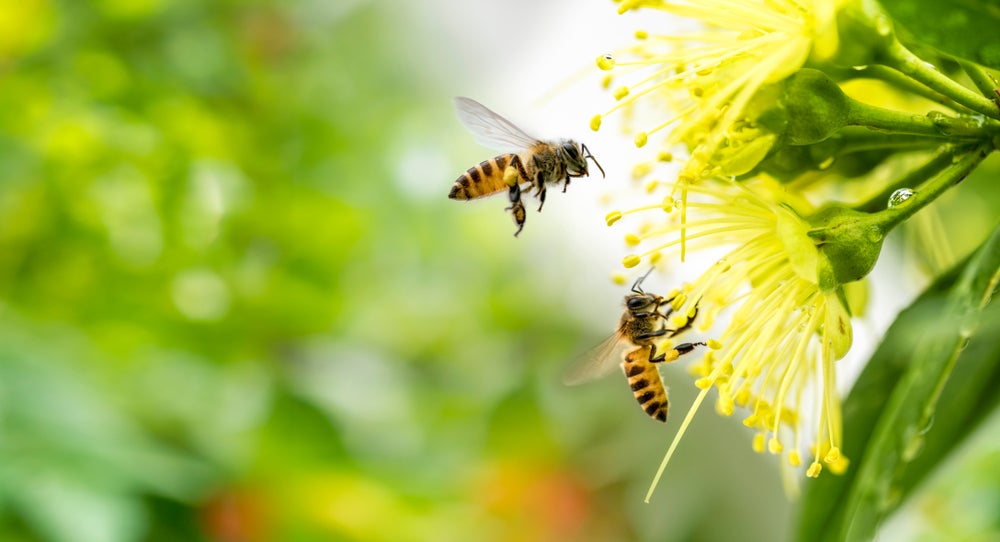Legal protections for nature are being strengthened around the world, and the impact pollinating species of insects such as bees have on food security is gaining special attention.
Agrochemicals like neonicotinoid (NN) pesticides can have a devastating impact on bees, so approaches to precision agriculture that minimise the exposure of pesticides to pollinators will be important for navigating these legal protections. One natural approach to distributing agrochemicals employs the bees themselves, and beyond protecting pollinators there are many reasons why farms across the world should adopt it.
Nature’s legal protections are growing day by day
On June 17, 2024, the EU narrowly passed a controversial nature restoration law that will require member states to restore 20% of their land and sea. The aim is to protect nature throughout the bloc to allow nature to perform uninhibited the many public services it does for free. These include mitigating floods, cleaning water, and mitigating anthropogenic climate change.
On top of these vital services, the global food supply depends heavily on nature to pollinate crops. Without pollinators—like bees, butterflies, and moths—people around the world would go hungry.
Despite its reliance on pollinators, the global agricultural industry continues contributing to their decline with the excessive use of pesticides. Many forms of pesticides—including herbicides, fungicides, and insecticides—disrupt the learning, memory, and navigation capabilities of bees. Some research also suggests that pesticides can damage bees’ reproductive abilities and that these effects can linger for several generations.
NN pesticides are believed to be particularly harmful. NNs have been banned in the UK and EU since 2018, but exemptions are frequently granted when crops are underperforming. This is an attempt to bolster food security, but the long-term impacts on pollinators could render these exemptions completely counterproductive.

US Tariffs are shifting - will you react or anticipate?
Don’t let policy changes catch you off guard. Stay proactive with real-time data and expert analysis.
By GlobalDataPrevious attempts to protect bees from pesticides have not been completely effective
An alternative approach to protecting bees and butterflies from pesticides is to incorporate the pollinators themselves into defending crops. Bee Vectoring Technologies is a Canada-based agribusiness and chemical company that does just that. It has developed a system that uses bees for the ultra-precise delivery of agrochemicals.
A dispenser system is integrated into the top of a commercial beehive. Commercially reared bees can then enter the hive through one opening before leaving through the dispenser. This ensures their legs pick up a powder form of the pesticide being administered. The powder is deposited on crops as the bees pollinate them.
This natural approach to precision agriculture ensures that agrochemicals are only applied where they are absolutely needed, not sprayed aimlessly across entire fields—minimising pesticide exposure to wildlife. On top of this, the fact that pollinators are used as a vector means that the agrochemicals being distributed must not be harmful to bees and butterflies.
Agribusinesses should look at bee vectoring for more than just conservation purposes
Bee vectoring has other benefits that will encourage its commercial uptake while supporting the protection of pollinators. First and foremost, precision agriculture maximises agricultural output while minimising resources used. This brings down the farming cost in every instance, but especially when the form of precision agriculture is as low-tech as bee vectoring.
Secondly, the production of agrochemicals is often very fossil-fuel intensive. This means that applying such chemicals prescriptively will help farmers bring down their value chain emissions. As carbon emissions restrictions tighten around the world, this will be vital for agribusinesses.
Finally, there is growing pressure on governments to regulate businesses’ approach to nature-related financial risks. In the future, companies and their directors could be held liable for failing to properly disclose and respond to such risks. As such, it is not only prudent but vital for agribusinesses to invest in protecting pollinators in this way.









